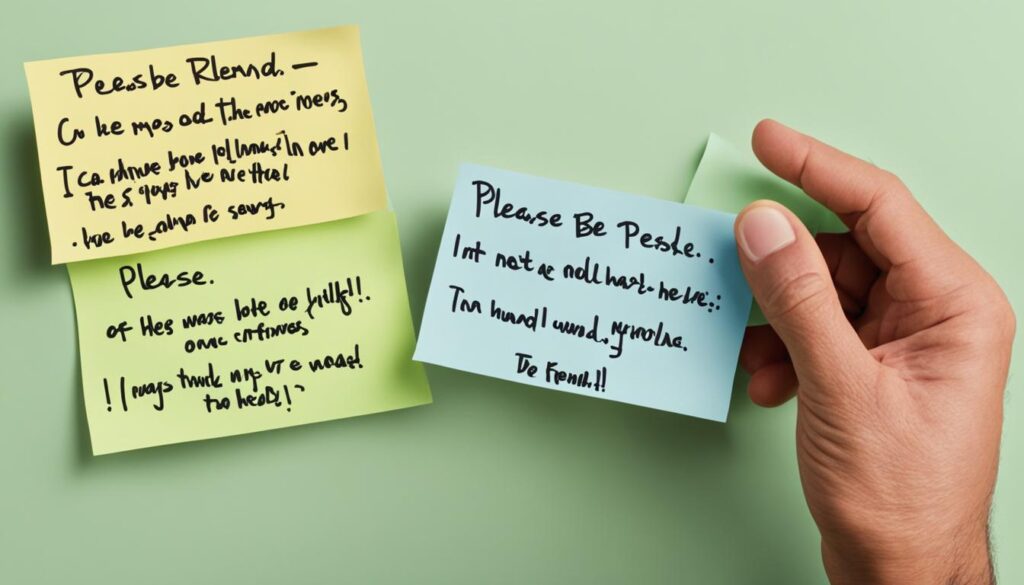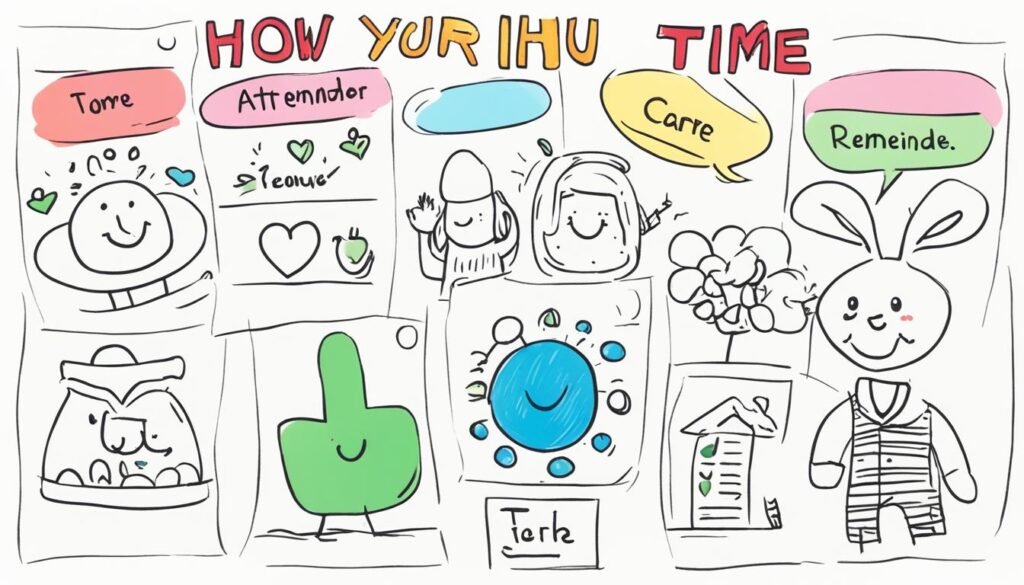When it comes to sending reminders through professional emails, the right choice of words can make all the difference. Instead of sticking to the common phrase ‘please be reminded’, why not explore alternative ways to deliver your message? By using polite phrases, you can add a touch of grace to your reminders, creating a more pleasant and friendly tone.
Reminders are an essential part of professional communication, whether it’s a gentle nudge to meet a deadline or a friendly prompt to attend a meeting. Politeness and respect are key in maintaining good relationships and ensuring effective communication within the workplace.
In this article, I will share alternative phrases and polite ways to express reminders in professional emails. With these suggestions, you can elevate your communication style and enhance the overall experience for both you and your recipients.
Key Takeaways:
- Polite phrases are crucial for effective communication in professional emails.
- Using alternatives to ‘please be reminded’ can add a touch of grace to your reminders.
- Consider your audience and the context before choosing the most suitable phrase.
- Using polite language fosters good relationships and ensures clarity in your messages.
- Choose from a variety of alternatives that suit different situations and levels of formality.
Is It Polite to Say ‘Please Be Reminded’?
In the realm of professional emails, the phrase ‘please be reminded’ has long been a staple in conveying important information. However, when it comes to maintaining a polite and friendly tone, is this phrase the most suitable choice? Let’s explore the pros and cons of using ‘please be reminded’ and consider alternative options for different situations.
The Politeness Dilemma
While ‘please be reminded’ is undeniably polite in its intention, it can sometimes come across as impersonal or distant in more casual or friendly emails. This professional phrase is typically best suited for formal settings, such as emails to colleagues or employees when you need to highlight the importance of a particular reminder.
“Please be reminded that the deadline for the upcoming project is fast approaching.”
Using ‘please be reminded’ exudes professionalism, but it may lack the warm and personal touch needed when interacting with close colleagues or friends. In such cases, opting for a more conversational approach can help establish a better rapport.
Alternatives to Consider
When seeking to inject politeness and friendliness into your reminders, please be reminded that there are alternative phrases that can achieve the desired effect. Here are a few suggestions to explore:
- A friendly reminder
- Just a quick reminder
- This is a gentle reminder
- I would like to remind you
These phrases offer the opportunity to convey your message sincerely while maintaining a polite and considerate tone. Let’s take a closer look at some scenarios where these alternatives can be applied effectively.
Polite Phrase Alternatives for Reminders
| Phrase | Suitable For |
|---|---|
| A friendly reminder | Emailing colleagues or friends |
| Just a quick reminder | Less vital situations or minor information updates |
| This is a gentle reminder | Conveying politeness while emphasizing an important deadline |
| I would like to remind you | Formal alternative for professional emails to employees |
Using these alternatives allows you to maintain a professional yet friendly approach that can lead to more engaging and satisfactory interactions with your email recipients.
In the next section, we will dive deeper into these alternatives and provide examples of how to incorporate them effectively into your professional emails. So, please be reminded to join us as we explore the power of polite reminders.
Looking for unique ways to wish a speedy recovery? Uncover our carefully curated list of alternative expressions and sincere phrases by visiting this page to express your heartfelt wishes for a swift return to health.
What to Say Instead of ‘Please Be Reminded’
When it comes to reminding someone without sounding impersonal, there are plenty of great alternatives to the common phrase ‘please be reminded’. By choosing polite and friendly ways to convey your message, you can maintain effective communication and build strong relationships. Here are some alternative phrases you can use in your emails:
- “Kindly remember”: This phrase adds a touch of grace and politeness to your reminder.
- “Just a gentle nudge”: A friendly and informal way to remind someone without sounding demanding.
- “I wanted to bring to your attention”: This phrase implies that you have something important to share and shows consideration for the recipient’s time.
- “As a friendly reminder”: A polite and conversational way to remind someone without being overly formal.
- “In case it slipped your mind”: This phrase acknowledges the possibility of forgetting and offers a helpful reminder.
By using these alternatives, you can create a more positive and respectful tone in your emails while ensuring your message is effectively conveyed.
“Kindly remember to submit the report by tomorrow. Your prompt action is highly appreciated.”
As you can see from the example above, using alternative phrases can make a polite and friendly impact on your email, prompting a more cooperative response from the recipient.
I Would Like to Remind You
A gentle and formal alternative to the phrase ‘please be reminded’ is ‘I would like to remind you’. This polite expression allows you to convey important deadlines or tasks to your employees without using overly friendly language. It maintains a professional tone while showing respect and consideration.
“I would like to remind you of the upcoming deadline for the project. Please ensure that all deliverables are submitted by the end of the day.”
This phrase can be particularly effective when addressing time-sensitive matters or when communicating with a professional audience. It emphasizes the significance of the deadline while maintaining a respectful and formal tone.
Using ‘I would like to remind you’ effectively
To make the most of this formal alternative, keep the following tips in mind:
- Be clear and concise: State the important deadline or task in a direct manner, ensuring there is no ambiguity.
- Use a professional tone: Maintain a formal and polite tone throughout the email, focusing on getting your point across without sounding demanding.
- Provide necessary details: Include any relevant information or instructions to help employees meet the deadline or complete the task successfully.
- Express gratitude: End the email with a polite expression of appreciation for their attention and cooperation.
The Benefits of Using ‘I would like to remind you’
By using ‘I would like to remind you’ as a formal alternative, you demonstrate your professionalism and attention to detail. This phrase conveys your commitment to ensuring that important deadlines are met without sounding authoritative or harsh. It helps maintain a positive working relationship while still effectively communicating the urgency of the matter at hand.
| Benefits of Using ‘I would like to remind you’ | Challenges of Using ‘I would like to remind you’ |
|---|---|
| 1. Maintains a professional tone. | 1. May come across as too formal in casual settings. |
| 2. Demonstrates respect and consideration. | 2. Can be perceived as repetitive if used excessively. |
| 3. Creates a clear sense of urgency without sounding demanding. | 3. May be less effective with employees who prefer a more direct communication style. |
Overall, ‘I would like to remind you’ provides a balanced approach to reminding employees of important deadlines or tasks. It allows you to maintain a professional image while effectively conveying the necessary information.
This Is a Friendly Reminder
In our professional communication, it’s vital to maintain a friendly and polite tone, especially when emailing colleagues or friends. Instead of using the standard phrase ‘please be reminded’, I suggest incorporating a conversational alternative that conveys the same message in a more amicable manner. One such expression that can be used is ‘This is a friendly reminder’.
By opting for this polite and engaging approach, you can ensure that your message comes across as friendly and considerate, rather than demanding or bossy. The phrase ‘This is a friendly reminder’ shows that you have something important to share without putting unnecessary pressure on the recipient.
“This is a friendly reminder to RSVP for the team lunch tomorrow. We don’t want you to miss out on the delicious food and bonding with your colleagues. Please let me know if you have any dietary restrictions or preferences”
Using this conversational alternative allows you to build a positive rapport with your colleagues or friends while effectively delivering important information. It adds a personal touch to your professional emails, making them more engaging and encouraging a sense of camaraderie.
Important Points to Remember:
- Use ‘This is a friendly reminder’ when emailing colleagues or friends
- Avoid using ‘please be reminded’ as it may appear formal or impersonal
- Ensure your tone remains friendly and considerate throughout the email
- Personalize the reminder to make it more engaging and tailored to the recipient
- Remember to include any relevant information or details in a clear and concise manner
Summary
When sending reminders to colleagues or friends, it’s important to adopt a friendly and polite approach. By using alternatives such as ‘This is a friendly reminder’, you can maintain a positive tone while effectively conveying your message. Remember to personalize the reminder and provide any necessary details to ensure clear communication.
Just a Quick Reminder
When it comes to sharing minor information or making slight changes to a schedule, sometimes you just need a quick and casual alternative to ‘please be reminded.’ Enter, ‘just a quick reminder,’ the perfect phrase for less vital situations where a casual tone is appropriate.
This alternative is great for those moments when you want to send a friendly nudge without putting too much pressure on the recipient. Whether it’s reminding your coworker about a team lunch or notifying your friend about a casual gathering, ‘just a quick reminder’ is your go-to choice.
Just a quick reminder, the team lunch is scheduled for tomorrow at 12:30 pm in the conference room. Looking forward to enjoying some delicious food and great company!
However, it’s important to note that ‘just a quick reminder’ should be used with caution. Avoid using it in high-pressure situations or when emailing employees about sensitive or important information. In such cases, a more formal approach would be more suitable for maintaining professionalism and conveying the seriousness of the subject matter.
But for those less vital situations where you want to maintain a casual and friendly tone, ‘just a quick reminder’ is the perfect choice. It helps you share minor information without overwhelming the recipient or making the email feel too formal or uptight.
So, please be reminded (pun intended), ‘just a quick reminder’ is your go-to phrase for sharing minor information in a casual and friendly manner. Now, let’s explore another alternative phrase that strikes a balance between casual and formal in the next section.
Just to Remind You
In our professional communication, finding the right words to convey a gentle reminder is essential. When emailing employees we have a good rapport with, it’s important to strike a balance between casual and polite. One effective alternative to say ‘please be reminded’ is to use the phrase ‘Just to remind you.’
“Just to remind you, we have a team meeting tomorrow at 9 AM. Your valuable contribution is highly anticipated. Looking forward to seeing you there!”
By using ‘Just to remind you’ in the email subject line or opening, I create a friendly and considerate tone that shows my appreciation for their presence and contribution. This casual alternative allows me to communicate important information in a personal and respectful manner, contributing to a positive and supportive work environment.
When emailing employees who already possess the necessary information but might need a gentle nudge, ‘Just to remind you’ serves as a polite and effective way to reinforce their knowledge without sounding overly formal or demanding.
Why ‘Just to Remind You’ Works:
- Creates a friendly and approachable tone
- Conveys consideration and appreciation
- Is suitable for employees you have a good relationship with
- Respects their time and responsibilities
Remember, finding the right alternative to say ‘please be reminded’ depends on the context and your relationship with the recipient. By using ‘Just to remind you,’ I’m able to combine casual friendliness with professional courtesy, fostering a positive work atmosphere while effectively sharing necessary information.
| Alternative Phrase | Suitable Context |
|---|---|
| ‘Just to remind you’ | Emailing employees you have a good relationship with |
| … | … |
As a Reminder
When it comes to sharing important information with email recipients, it is crucial to do so in a formal and professional manner. A formal alternative to the commonly used phrase ‘please be reminded’ is ‘as a reminder’. This phrase effectively conveys the message while maintaining a respectful tone. Whether the recipients are already aware of the information or need a gentle nudge, using ‘as a reminder’ helps reinforce the message without sounding repetitive or demanding.
“As a reminder, the deadline for submitting the financial report is tomorrow. Please ensure that it is completed and submitted accordingly. Thank you for your attention to this matter.
By incorporating ‘as a reminder’ into your emails, you can ensure that important details are brought to the recipients’ attention without sounding overly formal or impersonal. This phrase adds a touch of formality to the communication while still maintaining a sense of professionalism and respect towards the recipients.
Remember, the way you phrase your reminders can greatly impact the response you receive. By using a formal alternative such as ‘as a reminder’, you can effectively share important information with email recipients while fostering a positive and respectful communication environment.
In Case You Have Forgotten
Allow me to share an alternative phrase that can be used as a friendly synonym for ‘please be reminded’ — ‘In case you have forgotten’. This expression effectively conveys the message that I want to share important information with someone who may have already heard it before. It serves as a gentle reminder to prevent them from encountering any unwanted consequences or trouble.
When emailing colleagues or even friends, using the phrase ‘In case you have forgotten’ helps establish a considerate and helpful tone. It demonstrates that I am willing to assist them by providing a reminder, ensuring they stay well-informed and avoid any potential difficulties.
To effectively utilize this phrase, I would like to provide an example that showcases its appropriate usage:
Hi [Colleague’s Name],
I hope you’re having a great day. Just in case you have forgotten, our team meeting is scheduled for tomorrow at 2 PM in Conference Room B. It would be wonderful if you could join us and share your valuable insights.
Thank you so much! Looking forward to seeing you there.
Best regards,
[Your Name]
By incorporating the phrase ‘In case you have forgotten’ into the email, I am able to politely and kindly remind my colleague of the upcoming event without sounding too demanding or bossy. This approach fosters a warm and supportive work environment.
Remember that choosing the right alternative phrase and tone when sending reminders is crucial. It helps create a more polished and friendly impression while building and maintaining positive relationships with our colleagues.
Just to Confirm
In business email communication, it’s important to strike the right balance between professionalism and a friendly tone. When sending emails to colleagues whom I have a close working relationship with, I find that using the phrase ‘just to confirm’ works extremely well. This alternative phrase not only conveys the intention to confirm important details but also shows my respect for them as a close work friend.
By using ‘just to confirm,’ I am able to maintain the necessary level of professionalism required in business emails while also creating a sense of camaraderie and trust with my colleagues. This phrase indicates that I value their input and consider them an integral part of the communication process.
“Just to confirm, could you please review the attached presentation and provide any additional feedback you may have before our meeting tomorrow? Your insights are always valuable to me.”
By employing ‘just to confirm’ in my emails, I am able to establish a more relaxed and collaborative atmosphere, making it easier for my colleagues to engage in meaningful discussions and share their perspectives. Additionally, it helps foster a positive work environment where everyone feels heard and respected.
When using this phrase, it is important to keep in mind the context and nature of the communication. This alternative works best in less formal business settings and with colleagues you have a close working relationship with. It may not be suitable for emails to clients or superiors, where a more formal tone is required.
Overall, ‘just to confirm’ provides an effective way to reinforce important details in a casual yet professional manner. It not only helps to avoid any misunderstandings but also strengthens relationships with colleagues. So, why not give it a try in your next email and experience the positive impact it can have on your communication.
| Situations to Use ‘Just to Confirm’ | Situations to Avoid ‘Just to Confirm’ |
|---|---|
|
|
When used appropriately, ‘just to confirm’ can help you build stronger relationships with your colleagues, promote effective communication, and create a more positive work environment.
Conclusion
Polite reminders are a powerful tool for maintaining positive relationships and effective communication in professional emails. In this article, I have presented a range of alternative phrases to replace the commonly used ‘please be reminded’. By carefully selecting the right phrase and tone, you can create a polite and friendly impression that fosters a harmonious work environment.
When crafting your reminders, it is crucial to consider the context and the recipient’s relationship with you. Tailoring your approach to the specific situation will help you choose the most appropriate phrase from the alternatives provided. This will ensure that your reminders are received positively and effectively convey your message.
Remember, the key to successful communication is to strike a balance between politeness and professionalism. By incorporating these alternative phrases into your professional emails, you can enhance the overall tone and establish a respectful and collaborative atmosphere. Experiment with these alternative expressions and discover the power of polite reminders in your own email conversations.
FAQ
Is ‘please be reminded’ a polite phrase to use in professional emails?
While ‘please be reminded’ is a professional phrase commonly used in formal settings, it can come across as impersonal and is not suitable for friendly emails. However, it is appropriate to use in emails to employees or colleagues when you want to remind them of something important.
What are some alternatives to ‘please be reminded’?
There are plenty of great alternatives to ‘please be reminded’ that convey the same message in a more polite and friendly manner. In this article, we have provided a list of phrases you can use instead, along with examples to help you understand how to use them in your emails.
How can I formally remind someone without using ‘please be reminded’?
One formal alternative to ‘please be reminded’ is ‘I would like to remind you.’ This phrase is suitable for emails to employees about important deadlines or tasks.
What is a polite and conversational alternative to ‘please be reminded’?
‘This is a friendly reminder’ is a polite and conversational alternative that works well when emailing colleagues or friends. This phrase shows that you have something to share with them without appearing demanding or bossy.
When should I use ‘just a quick reminder’ as an alternative to ‘please be reminded’?
‘Just a quick reminder’ is a casual alternative that is suitable for sharing minor information or making slight changes to a schedule. However, it should be avoided in high-pressure situations or when emailing employees about sensitive or important information.
How can I politely remind someone of something in a casual manner?
‘Just to remind you’ is a casual alternative that allows you to remain polite when sharing minor information with someone. It works well when emailing employees you have a good relationship with, as it shows that you want to talk to them in a friendly manner and remind them of something that may impact their work.
How can I share important information with the email recipients using an alternative to ‘please be reminded’?
‘As a reminder’ is a formal alternative that shows you are sharing important information with the email recipients. This phrase is useful even if someone has already remembered the information, as it serves to reinforce the message.
What is a friendly synonym for ‘please be reminded’?
‘In case you have forgotten’ is a friendly synonym that shows you want to share information with someone that they may have already heard. It works well when emailing colleagues and offering them a reminder to prevent them from getting in trouble.
Can I use ‘just to confirm’ as a casual alternative to ‘please be reminded’ in business emails?
‘Just to confirm’ is a more casual alternative that works well in business emails, especially when emailing colleagues you have a close relationship with. It shows that you respect them and think of them as a close work friend rather than just another staff member.
Why is it important to use polite reminders in professional emails?
Polite reminders can go a long way in maintaining good relationships and effective communication. By choosing the right phrase and tone, you can create a more polite and friendly impression.
Source Links
- https://englishrecap.com/polite-ways-to-say-please-be-reminded/
- https://wordselector.com/other-ways-to-say-please-be-reminded/
- https://synonympro.com/how-do-you-say-please-be-reminded-politely/













